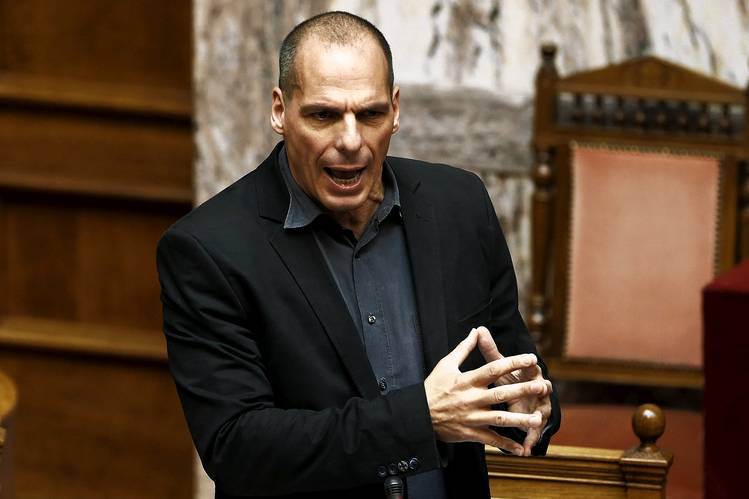– Concerned About “Treason” Charges, Varoufakis Issues Public Statement On “Cloak And Dagger” Drachma “Plan B” (ZeroHedge, July 27, 2015):
Over the weekend, the media world was abuzz with the leaked recording made during a July 16 “Greek Day” meeting by the Official Monetary and Financial Institutions Forum (OMFIF) which included a group of sovereign wealth funds, pension funds, and life insurers in which it was reveaked that Yanis Varoufakis had been in the process of preparing Greece for a cloak and dagger “Plan B” which included as its highlight a process for returning to the Drachma.
Previously we presentted both the Kathimerini framing of this leak, as well as the recording itself (which was hardly supposed to be made public).
Overnight, the Telegraph’s Ambrose-Pritchard reported that “Mr Varoufakis told the Telegraph that the quotes were accurate but some reports in the Greek press had been twisted, making it look as if he had been plotting a return to the drachma from the start.
“The context of all this is that they want to present me as a rogue finance minister, and have me indicted for treason. It is all part of an attempt to annul the first five months of this government and put it in the dustbin of history,” he said.
“It totally distorts my purpose for wanting parallel liquidity. I have always been completely against dismantling the euro because we never know what dark forces that might unleash in Europe,” he said.
It remains to be seen if treason charges are forthcoming but Varoufakis isn’t wasting time, and after giving unofficial on the record comments to the Telegraph, moments ago he issued the following public statement on his blog. The highlights are ours.
* * *
Statement by Yanis Varoufakis on the FinMin’s Plan B Working Group & the parallel payment system
During the Greek government’s negotiations with the Eurogroup, Minister Varoufakis oversaw a Working Group with a remit to prepare contingency plans against the creditors’ efforts to undermine the Greek government and in view of forces at work within the Eurozone to have Greece expelled from the euro. The Working Group was convened by the Minister, at the behest of the Prime Minister, and was coordinated by Professor James K. Galbraith. (Click here for a statement on the matter by Professor Galbraith).
It is worth nothing [ZH: sic, we hope] that, prior to Mr Varoufakis’ comfirmation of the existence of the said Working Group, the Minister was criticized widely for having neglected to make such contingency plans. The Bank of Greece, the ECB, treasuries of EU member-states, banks, international organisations etc. had all drawn up such plans since 2012. Greece’s Ministry of Finance would have been remiss had it made no attempt to draw up contingency plans.
Ever since Mr Varoufakis announced the existence of the Working Group, the media have indulged in far-fetched articles that damage the quality of public debate. The Ministry of Finance’s Working Group worked exclusively within the framework of government policy and its recommendations were always aimed at serving the public interest, at respecting the laws of the land, and at keeping the country in the Eurozone.
Regarding the recent article by “Kathimerini” newspaper entitled “Plan B involving highjacking and hacking”, Kathimerini’s failure to contact Mr Varoufakis for comment and its reporter’s erroneous references to “highjacking tax file numbers of all taxpayers” sowed confusion and contributed to the media-induced disinformation. The article refers to the Ministry’s project as described by Minister Varoufakis in his 6th July farewell speech during the handover ceremony in the Ministry of Finance. In that speech Mr Varoufakis clearly stated: “The General Secretariat of Information Systems had begun investigating means by which Taxisnet (Nb. the Ministry’s Tax Web Interface) could become something more than it currently is, to become a payments system for third parties, a system that improves efficiency and minimises the arrears of the state to citizens and vice versa.” That project was not part of the Working Group’s remit, was presented in full by Minister Varoufakis to Cabinet, and should, in Minister Varoufakis’ view, be implemented independently of the negotiations with Greece’s creditors, as it will contribute considerable efficiency gains in transactions between the state and taxpayers as well as between taxpayers.
In conclusion, during the five months of negotiations that gripped Europe and changed the debate throughout the Continent, the Ministry of Finance did everything possible to serve the public interest against many odds. The current media campaign to besmirch these efforts will fail to dent the legacy of a crucial five month struggle for democracy and common sense.
